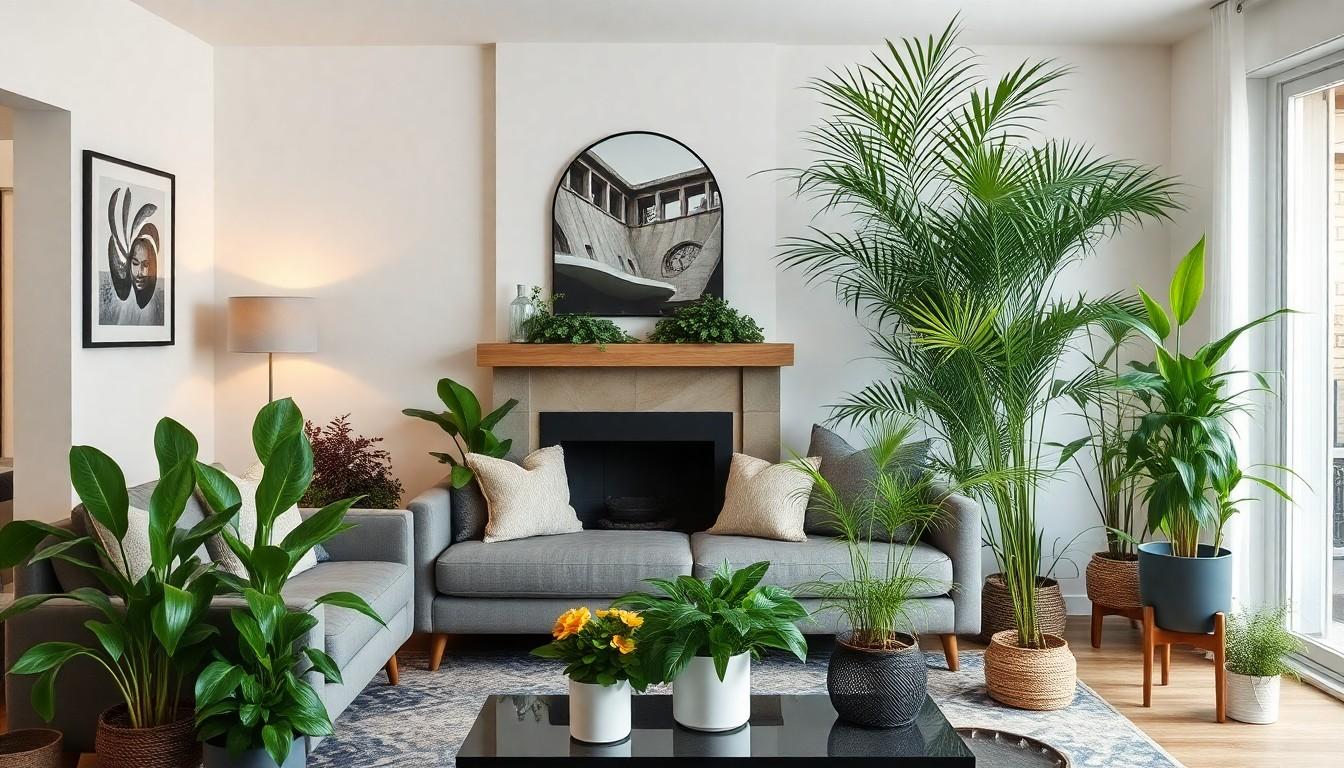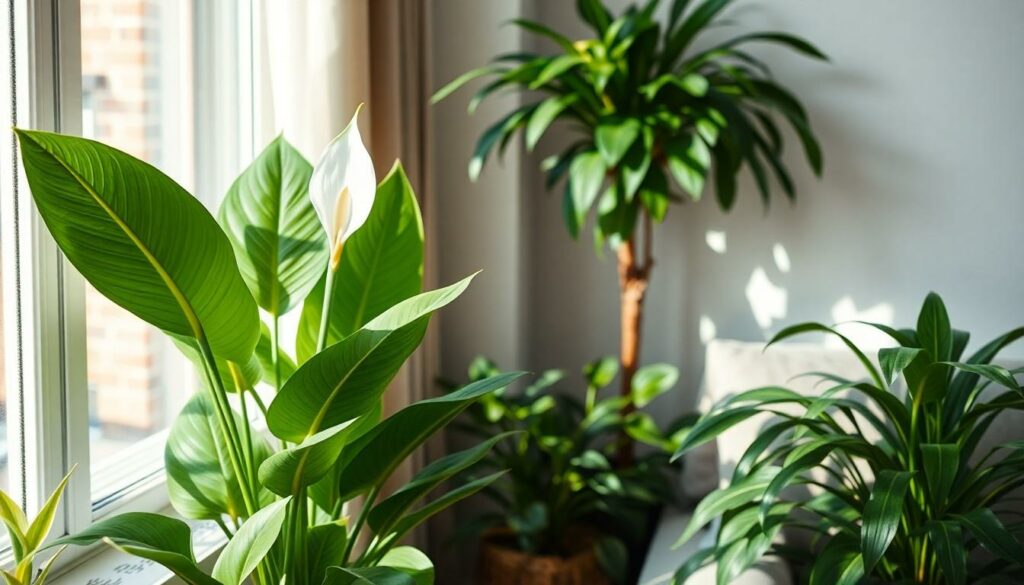Table of Contents
ToggleIndoor plants aren’t just for show; they’re like tiny green superheroes fighting off air pollutants while looking fabulous. Imagine transforming your living space into a lush oasis that not only beautifies your home but also purifies the air you breathe. Who knew that a little foliage could pack such a powerful punch against toxins?
Benefits of Indoor Plants for Air Purification
Indoor plants significantly improve air quality and offer numerous psychological advantages. These benefits make them essential additions to any indoor environment.
Improved Air Quality
Indoor plants act as natural air purifiers by absorbing toxins and releasing oxygen. Common plants like spider plant, peace lily, and snake plant excel in filtering indoor pollutants such as formaldehyde and benzene. Research shows that certain plants can remove up to 87% of volatile organic compounds in just 24 hours. Healthy air contributes to overall well-being, reducing allergy symptoms and respiratory issues. Maintaining several of these plants enhances the quality of air in living spaces, creating a cleaner atmosphere for occupants.
Psychological Benefits
Adding indoor plants positively impacts mental health and productivity. Studies indicate that plants can reduce stress and anxiety levels, promoting relaxation in individuals. Exposure to greenery boosts mood and enhances focus, leading to increased creativity and better performance in tasks. A presence of indoor plants fosters a sense of tranquility and connection to nature, crucial in urban environments. Incorporating plants into homes or offices creates a calming ambiance, benefiting emotional well-being significantly.
Top Indoor Plants for Air Purification

Indoor plants significantly enhance air quality and create inviting spaces. They serve as effective air purifiers while promoting overall well-being.
Snake Plant
Snake plants thrive in low light and require minimal care. This hardy plant absorbs toxins like formaldehyde and nitrogen oxides. Its upright leaves add a striking visual element to rooms. With its ability to release oxygen at night, snake plants improve indoor air quality even during sleep. These features make it an ideal choice for bedrooms and living areas.
Peace Lily
Peace lilies excel in removing harmful pollutants from the air. They effectively filter out ammonia, benzene, and formaldehyde, promoting a healthier environment. Their elegant white blooms provide aesthetic appeal while contributing to air purification. These plants prefer indirect light and need regular watering. With proper care, peace lilies flourish and offer consistent air-cleaning benefits.
Spider Plant
Spider plants adapt well to various indoor conditions, making them versatile options. Rich in chlorophyll, they absorb indoor pollutants like carbon monoxide and formaldehyde. Their distinctive arching leaves and spider-like offshoots create an eye-catching display. They thrive in bright, indirect light and are easy to propagate. This plant’s resilience and air-purifying capabilities make it a popular choice for homes.
Bamboo Palm
Bamboo palms generate a tropical vibe while purifying the air. They reduce indoor pollutants such as formaldehyde and benzene effectively. Thriving in low light, these palms are perfect for shaded areas of a home. Maintenance is straightforward, requiring only regular watering and occasional pruning. With their attractive fronds, bamboo palms enhance aesthetics and contribute to cleaner air.
How to Care for Indoor Air-Purifying Plants
Caring for indoor air-purifying plants enhances their ability to thrive and filter air effectively. Understanding light requirements, watering guidelines, and fertilization tips ensures optimal growth.
Light Requirements
Different plants have varying light needs. Snake plants and spider plants tolerate low light, making them great for shady spaces. Peace lilies prefer bright, indirect sunlight for optimal growth yet can survive in lower light conditions. Bamboo palms thrive in moderate light but benefit from some exposure to bright light as well. Assess the light conditions of each room to place these plants strategically.
Watering Guidelines
Watering frequency depends on the specific plant and environment. Snake plants require infrequent watering, typically every three weeks, as they store moisture in their leaves. Peace lilies prefer consistently moist soil, so checking the top inch of the soil helps determine when to water. Spider plants need slightly moist conditions, allowing the topsoil to dry out completely before rehydrating. Bamboo palms thrive in evenly moist soil without being overwatered.
Fertilization Tips
Fertilization supports healthy growth and vitality. During the growing season, typically spring and summer, use a balanced liquid fertilizer every four to six weeks for peace lilies and spider plants. Snake plants require less fertilizer; applying a diluted formula once in spring suffices. Bamboo palms benefit from foliage fertilizer applied every two months to encourage lush growth. Adjust fertilization based on plant growth and specific needs.
Common Myths About Indoor Plants
Indoor plants possess remarkable abilities, but several myths persist regarding their air purification capabilities and care requirements.
Myth 1: All Plants Purify Air
Not all houseplants provide the same air purification benefits. Effective purifiers, such as snake plants and peace lilies, undergo extensive research demonstrating their ability to remove specific toxins. Many common varieties lack this capability, resulting in disappointment for those seeking cleaner air. Understanding which plants excel in air purification helps individuals choose wisely for their living spaces.
Myth 2: Plants Are High Maintenance
Indoor plants often get a bad rap regarding maintenance. Many popular varieties, like the spider plant and snake plant, thrive on minimal care. These species offer resilience and adaptability, making them excellent choices for busy individuals. With proper care guidelines, even novice plant owners can enjoy the benefits of air purification without feeling overwhelmed. When chosen wisely, plants can easily fit into various lifestyles and routines.
Indoor plants offer a simple yet effective way to enhance air quality and overall well-being. By choosing the right varieties like snake plants, peace lilies, and spider plants, anyone can create a healthier living environment. These plants not only purify the air but also bring a sense of tranquility and connection to nature. With minimal care requirements, they fit seamlessly into various lifestyles, making it easy for anyone to enjoy their benefits. Embracing indoor plants is a step toward a more vibrant and refreshing home atmosphere.






